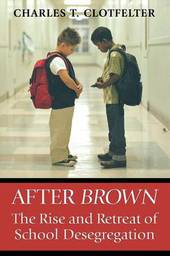
|
After Brown: The Rise and Retreat of School Desegregation
Paperback / softback
Main Details
| Title |
After Brown: The Rise and Retreat of School Desegregation
|
| Authors and Contributors |
By (author) Charles T. Clotfelter
|
| Physical Properties |
| Format:Paperback / softback | | Pages:272 | | Dimensions(mm): Height 235,Width 152 |
|
| Category/Genre | History of specific subjects |
|---|
| ISBN/Barcode |
9780691126371
|
| Classifications | Dewey:379.263 |
|---|
| Audience | | Professional & Vocational | | Tertiary Education (US: College) | |
|---|
| Illustrations |
15 line illus. 39 tables.
|
|
Publishing Details |
| Publisher |
Princeton University Press
|
| Imprint |
Princeton University Press
|
| Publication Date |
19 March 2006 |
| Publication Country |
United States
|
Description
The United States Supreme Court's 1954 landmark decision, Brown v Board of Education, set into motion a process of desegregation that would transform American public schools. This book provides an assessment of how Brown's most visible effect, contact between students of different racial groups, has changed over the fifty years since the decision.
Author Biography
Charles T. Clotfelter is Z. Smith Reynolds Professor of Public Policy and Professor of Economics and Law at Duke University. He is also a Research Associate of the National Bureau of Economic Research. His books include "Buying the Best: Cost Escalation in Elite Higher Education" (Princeton).
ReviewsCo-Winner of the 2005 Gladys M. Kammerer Award, American Political Science Association "[A] richly instructive 'arithmetical history' of how educational integration waxed and then waned in the years after Brown."--David J. Garrow, The Nation "This is an important book, with thorough analysis supported by both historical and current data. Clotfelter's angle of vision measuring the lack of interracial contact, is both insightful and informative."--Library Journal "After Brown is an unusually comprehensive and well-documented analysis of trends in the last five decades in the levels of segregation in American education... It is the most current, most comprehensive reference work available today."--John R. Logan, American Journal of Sociology
|